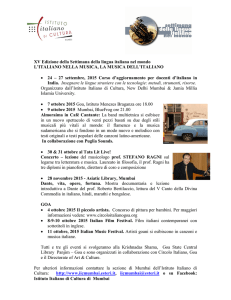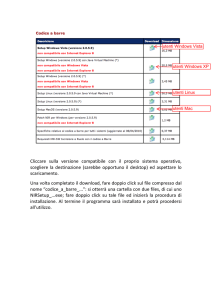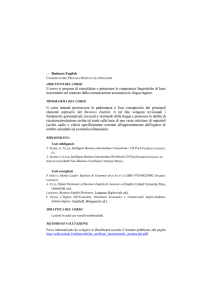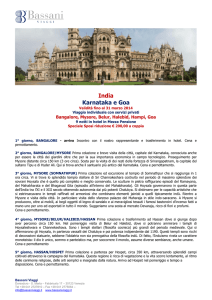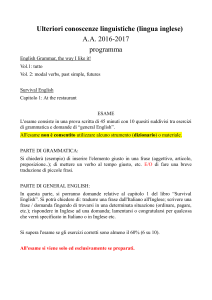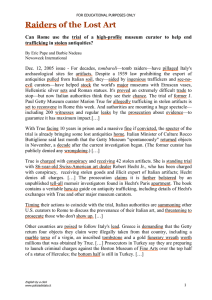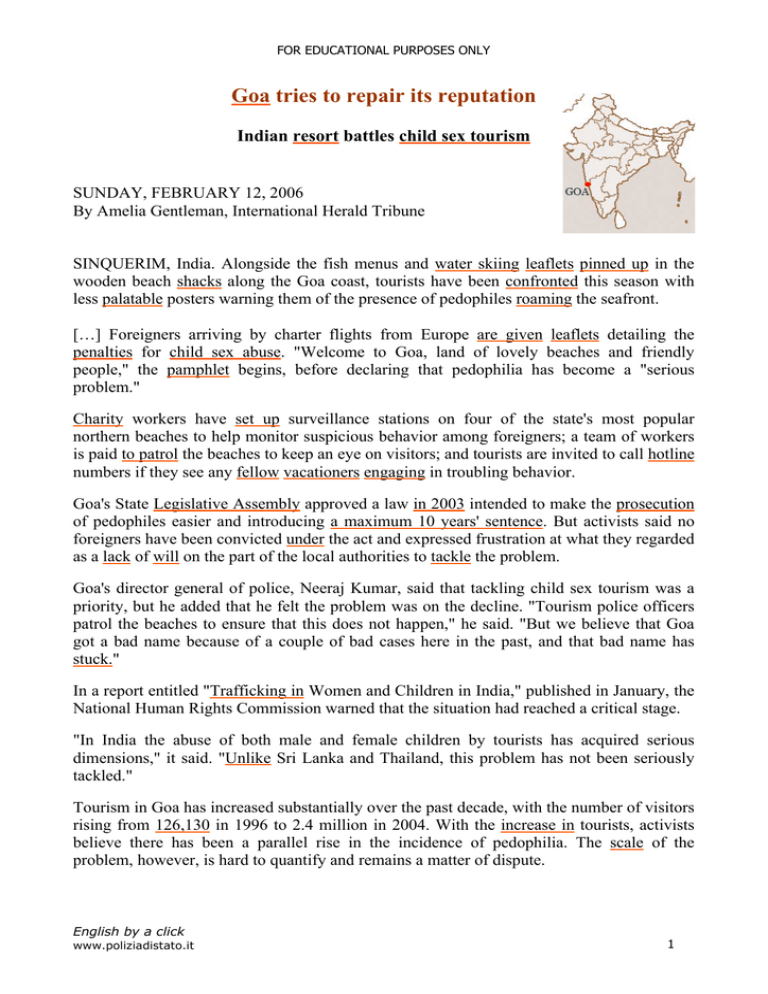
FOR EDUCATIONAL PURPOSES ONLY
Goa tries to repair its reputation
Indian resort battles child sex tourism
SUNDAY, FEBRUARY 12, 2006
By Amelia Gentleman, International Herald Tribune
SINQUERIM, India. Alongside the fish menus and water skiing leaflets pinned up in the
wooden beach shacks along the Goa coast, tourists have been confronted this season with
less palatable posters warning them of the presence of pedophiles roaming the seafront.
[…] Foreigners arriving by charter flights from Europe are given leaflets detailing the
penalties for child sex abuse. "Welcome to Goa, land of lovely beaches and friendly
people," the pamphlet begins, before declaring that pedophilia has become a "serious
problem."
Charity workers have set up surveillance stations on four of the state's most popular
northern beaches to help monitor suspicious behavior among foreigners; a team of workers
is paid to patrol the beaches to keep an eye on visitors; and tourists are invited to call hotline
numbers if they see any fellow vacationers engaging in troubling behavior.
Goa's State Legislative Assembly approved a law in 2003 intended to make the prosecution
of pedophiles easier and introducing a maximum 10 years' sentence. But activists said no
foreigners have been convicted under the act and expressed frustration at what they regarded
as a lack of will on the part of the local authorities to tackle the problem.
Goa's director general of police, Neeraj Kumar, said that tackling child sex tourism was a
priority, but he added that he felt the problem was on the decline. "Tourism police officers
patrol the beaches to ensure that this does not happen," he said. "But we believe that Goa
got a bad name because of a couple of bad cases here in the past, and that bad name has
stuck."
In a report entitled "Trafficking in Women and Children in India," published in January, the
National Human Rights Commission warned that the situation had reached a critical stage.
"In India the abuse of both male and female children by tourists has acquired serious
dimensions," it said. "Unlike Sri Lanka and Thailand, this problem has not been seriously
tackled."
Tourism in Goa has increased substantially over the past decade, with the number of visitors
rising from 126,130 in 1996 to 2.4 million in 2004. With the increase in tourists, activists
believe there has been a parallel rise in the incidence of pedophilia. The scale of the
problem, however, is hard to quantify and remains a matter of dispute.
English by a click
www.poliziadistato.it
1
FOR EDUCATIONAL PURPOSES ONLY
Venicia Cardoso, director of Children's Rights in Goa, a charity that is campaigning to
prevent the growth of the problem, said staff members were now handling about four
complaints a month, often from tourists calling the numbers advertised on their posters or
visiting their beach monitoring centers.
This is double the number in 2000, when the organization began its work, although she said
it was difficult to assess whether the rise represented a true increase or was the result of
growing awareness of how to deal with the problem. […]
There is no nationwide legislation in India that addresses pedophilia, but the state passed the
Goa Children's Act in 2003 to tackle the issue. The legislation included penalties for
trafficking in children and it required that the police, tourist officials and hotel owners be
"sensitized" to the issue.
"The act is a very progressive act, but the problem in our country is implementation," said
Arun Pandey, the director of Arz Goa, a charity made up of lawyers and social workers.
"We have seen a lot of acquittals. Because the implementation is not good, pedophiles do
find that Goa is a safe haven."
Match a line in A with a line in B:
A:
Solution
1. Leaflets on child sex abuse
Solution
2. Goa’s law-makers approved an act
Solution
3. According to the chief of Goa Police
Solution
4. Pedophilia has been successfully handled
Solution
5. Many pedophiles have been cleared from charges
B:
a. introducing more severe punishment for child abusers.
b. because it is difficult to implement the law,
c. in other Asian countries.
d. are distributed among tourists.
e. this kind of crimes has decreased.
English by a click
www.poliziadistato.it
2
Gli appunti di English by a click
Goa tries to repair its reputation
Goa: small state of south‐western India. A former Portuguese colony and Indian union territory, Goa became a state in 1987. Internationally renowned for its beaches, Goa is visited by hundreds of thousands of foreign and domestic tourists each year. Child sex tourism: la legge 269/98 lo definisce “turismo sessuale in danno di minori”. Resort: a place frequented by people for relaxation or recreation, a holiday center: luogo di villeggiatura; a seaside resort è una stazione balneare. Pinned up [to pin, pinned, pinning, pins]: to fasten or secure with or as if with a pin or pins: appendere, affiggere. Da questo verbo derivano l’aggettivo e il sostantivo pinup (o pin‐up), per l'abitudine diffusa di ritagliare e appendere le foto di persone attraenti, più o meno famose, in genere ragazze. Anche nel dizionario italiano si trova pin‐up girl, spesso abbreviato in pin‐up. Leaflet: a usually folded printed sheet intended for free distribution: dépliant, volantino. Water skiing: gliding over water by means of a pair of narrow strips of wood, metal, or plastic curving upward in front: sci d’acqua. Confronted [to confront confronted, confronting, confronts]: to be confronted by: trovarsi di fronte a. ©English by a click
www.poliziadistato.it
I
Gli appunti di English by a click
Goa tries to repair its reputation
Roaming [to roam, roamed, roaming, roams]: to go or go over from place to place without a plan, to wander: vagare, girovagare. Il termine roaming è usato anche in italiano in relazione alla telefonia mobile: il roaming internazionale, infatti, è il sistema che consente di ricevere ed effettuare chiamate con il proprio telefono cellulare, ed utilizzare tutti i servizi sottoscritti (SMS, trasmissione dati e fax, ecc.), se disponibili, anche quando ci si trova in un paese estero in cui sia presente un operatore che abbia stipulato un accordo di roaming con il proprio gestore. Palatable: agreeable, acceptable: saporito, gustoso, gradevole. Leaflet: a usually folded printed sheet intended for free distribution: dépliant, volantino. Are given: da notare la diversa costruzione tra italiano e inglese. To give, insieme a altri verbi tra cui to ask, to bring, to show, to tell, to offer, può nella forma attiva avere il doppio complemento oggetto: My father gave me a watch. Questi verbi possono avere due forme passive: This watch was given (to) me by my father e I was given this watch by my father. Questa seconda forma è tipicamente inglese ed è preferita nell’uso. Non è necessario indicare il complemento d’agente: I was asked a question. Child sex abuse: violenze sessuali su minori. Penalty: punishment for a crime or offense: pena. Pamphlet: a short essay or treatise, usually on a current topic, published without a binding: opuscolo, brochure. Da un punto di vista storico, il pamphlet è un genere letterario che consiste in un testo breve, per lo più con intenti polemici. Set up: dal verbo to set [pass. set, p.p. set, setting, set]: to organize: organizzare, mettere su. Charity: an institution, organization, or fund established to help the needy: istituzione benefica. È anche carità, beneficienza. ©English by a click
www.poliziadistato.it
II
Gli appunti di English by a click
Goa tries to repair its reputation
Hotline: a telephone line that gives quick and direct access to a source of information or help: linea diretta, servizio di assistenza telefonica. To patrol [patrolled, patrolling,, patrols]: the act of moving about an area especially by an authorized and trained person or group, for purposes of observation, inspection, or security: pattugliare, perlustrare. Il sostantivo è patrol=pattuglia. Engaging [to engage, engaged, engaging, engages]: to draw into, involve: partecipare, prendere parte. Vacationers: deriva da vacation=vacanza, BE holiday. Vacationer: AE vacanziere ‐ BE: holidaymaker. In AE the holidays sono le feste… In AE si distingue quindi tra ferie/vacanze e le festività religiose e civili. In vacanza si dice on vacation (AE) e on holiday (BE). Vacanza nel senso di posto (di lavoro) vacante o libero è vacancy. Vacancy si usa anche negli alberghi per indicare la disponibilità di stanze libere. Vacancies corrisponde a “stanze libere”, mentre No vacancies corrisponde al nostro “(al) completo”. Fellow: belonging to the same group, occupation, rank, or location; having in common certain characteristics or interests. Come sostantivo: (coll.) a man or boy: tipo, tizio. Nel testo fellow vacationers potrebbe essere tradotto come altri vacanzieri, vacanzieri come loro. Prosecution: il termine indica l’azione penale (talvolta anche quella civile), ma può indicare anche l’organo competente a esercitarla. In 2003: da notare che, a differenza dell’italiano, in inglese non c’è l’articolo quando si indica l’anno. Legislative Assembly: assemblea legislativa, parlamento. A maximum 10 years’ sentence: the punishment set by a court; sentence non indica la sentenza, che è detta judgment, ma la condanna, la pena. Under: qui subject to the authority, rule, or control of: ai sensi di, conformemente a. ©English by a click
www.poliziadistato.it
III
Gli appunti di English by a click
Goa tries to repair its reputation
To tackle [to tackle, tackled, tackling, tackles]: to engage or deal with: affrontare. In termini sportivi, nel calcio to tackle significa contrastare, entrare in tackle su; nel rugby e nel football americano significa placcare. Ricordiamo che quello che in Gran Bretagna e Italia è football, negli Stati Uniti è definito soccer per distinguerlo dal football americano. Will: diligent purposefulness; determination: volontà. Will è anche il testamento. Lack: something that is lacking or is needed: mancanza. Stuck [to stick, pass. stuck, p.p. stuck, sticking, sticks]: qui le è rimasto (appiccicato). Trafficking in: da ricordare che in inglese i sostantivi traffic e trafficking reggono la preposizione in. Unlike: different from, in a different manner from: a differenza di, contrariamente, diversamente da. Increase in: aumento, crescita; questo sostantivo è seguito dalla preposizione in (di in italiano). La stessa preposizione si ritrova poco più avanti anche con a rise in. 126,130: in italiano si trascrive come 126.130. Ricordiamo che l’uso di virgole e punti differisce tra le due lingue. La virgola decimale in italiano diventa punto in inglese, mentre il punto utilizzato per separare centinaia da migliaia è una virgola in inglese. Scale: qui è la portata. In altri contesti ha anche il significato di scaglia, squama. Scales è bilancia. Handling [to handle, handled, handling, handles]: to deal with or act on: trattare, occuparsi di. Il verbo to handle significa anche maneggiare, manovrare, infatti sui pacchi contenenti merci frangibili si trova la scritta “handle with care”: maneggiare con cura/fragile. Come sostantivo handle significa maniglia. Complaints: a complaint is a cause or reason for complaining: lamentela, ma anche reclamo. ©English by a click
www.poliziadistato.it
IV
Gli appunti di English by a click
Goa tries to repair its reputation
To assess [assessed, assessing, assesses]: to find out or decide the importance, size, or value of: valutare. To deal with [dealt, dealing, deals]: to have to do, to treat, to handle: trattare, occuparsi di, affrontare. Awareness: the condition of being aware: consapevolezza, ma qui è piuttosto sensibilizzazione. Passed [to pass, passed, passing, passes]: to approve officially: approvare, far passare. Addresses [to address, addressed, addressing, addresses]: to deal with: affrontare, occuparsi. Il sostantivo address è indirizzo, recapito. Nationwide: extending throughout a nation: in tutto il paese, su scala nazionale. Espressioni analoghe sono worldwide, statewide, countrywide che si formano sempre con l’aggiunta del suffisso –wide. Issue: qui: a point of debate or controversy, a topic for discussion: questione, problema. Act: a law made by a governing body: legge. Required [to require, required, requiring, requires]: to impose an obligation on; compel: esigere, richiedere. Sensitized [to sensitize, sensitized, sensitizing, sensitizing]: to make or become sensitive: sensibilizzare. Implementation: the act of putting into play, to carry out: attuazione, applicazione. Made up of [to make, made, made, making, makes]: to compose: composto di, di cui fanno parte. ©English by a click
www.poliziadistato.it
V
Gli appunti di English by a click
Goa tries to repair its reputation
Acquittals: acquittal is a judgment given by a judge or jury that somebody is not guilty of a charge: assoluzione. Si tratta dell’assoluzione per non colpevolezza: l’imputato viene assolto sulla base di un verdetto di innocenza (not guilty). Il verbo corrispondente è to acquit. L’assoluzione per insufficienza di prove si traduce invece acquittal for lack (or want) of evidence to convict. Va sempre evidenziata la profonda differenza tra i sistemi giuridici di origine romanistica e quelli anglosassoni. Molto spesso non esiste una perfetta corrispondenza e la traduzione può essere approssimativa. Haven: shelter: rifugio, oasi. Tax haven è tradotto come paradiso fiscale. Da notare che questa traduzione può derivare dalla confusione tra haven e heaven=paradiso. È indubbio che i tax havens, spesso con sede in amene località, siano di fatto un paradiso per chi vi trova riparo, e questo ha sicuramente favorito il prevalere dell’aspetto paradisiaco. ©English by a click
www.poliziadistato.it
VI

